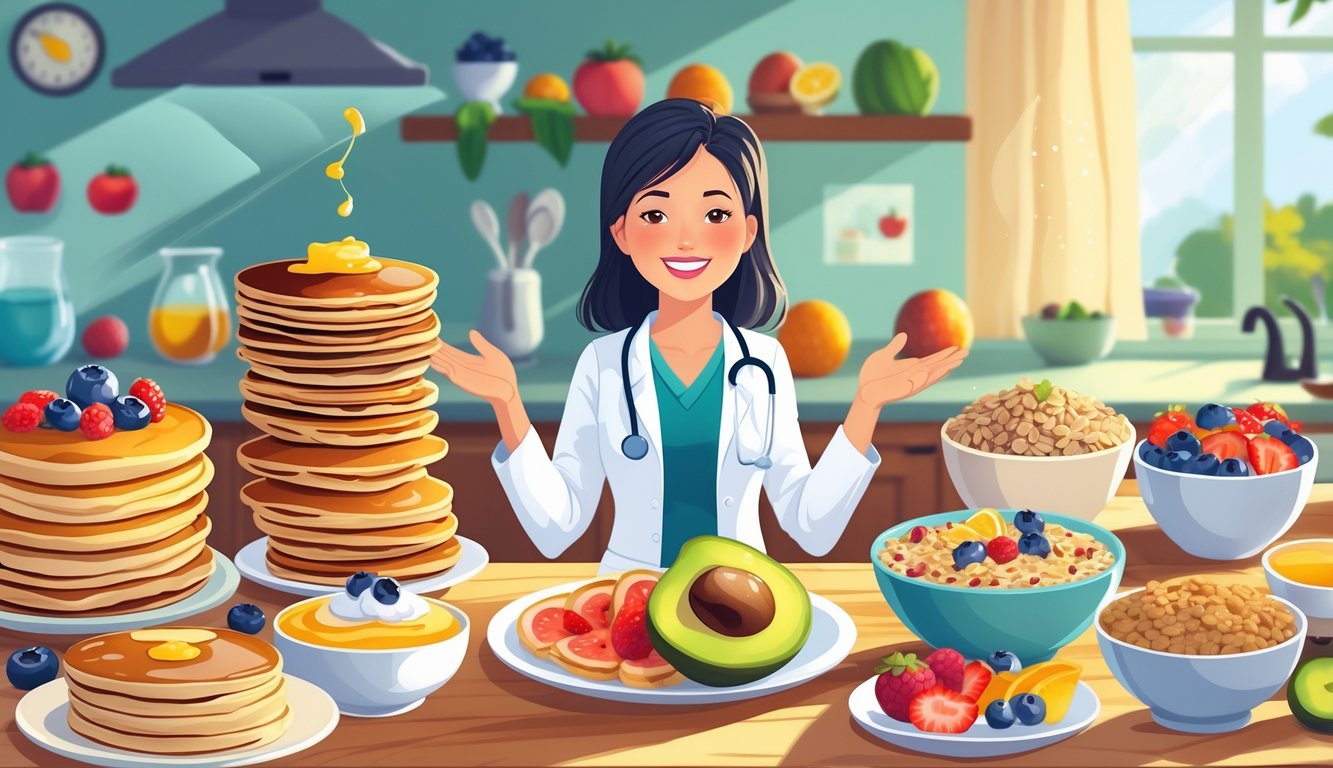
Why do people act like eating leftover stir-fry for breakfast is some sort of crime against humanity? I mean, my friend’s a dietitian—she’s obsessed with this stuff, loves to remind me how swapping so-called “healthy” breakfast foods actually keeps people fuller, and yeah, she’s got the studies to back it up (she’ll send you a spreadsheet if you ask). Dietitians keep insisting that ditching processed breakfast junk for high-protein or fiber-packed stuff really works if you want to stay full or not spiral into a snack frenzy. But honestly, bagels? I swear they’re just edible air. I’m hungry again before I even finish my coffee.
Eggs are great and all, but try finding them during a shortage—good luck. So then it’s tofu, or you get dragged into a Greek yogurt vs. cottage cheese debate (which, by the way, nobody wins). I read somewhere (don’t ask me where) that swapping eggs for nuts might lower your heart attack risk. Apparently, nuts are having a PR moment. Except, if you’re allergic? My coworker threatens to rebel and just eat pancakes. Also, if you think Maple Frosted Waffles are health food, you might wanna skip the nutritionist’s opinion on syrup.
Some days, swapping bacon for beans just feels wrong and slightly disrespectful to breakfast. Then you see some fitness coach dropping 45 pounds just from swaps that honestly sound like punishment. Is it the fiber? The novelty? No clue. I just know high-protein breakfasts (that don’t taste like cardboard), skipping the drive-thru, or even just scrolling healthy food swaps that actually work while half-awake—these things apparently matter. And yes, there are people who survive mornings without coffee. I don’t trust them.
Why Breakfast Swaps Matter
Every time I try to replace my bagel with Greek yogurt, my taste buds expect sugar but my body just… doesn’t. Swapping up breakfast isn’t some invisible “health” thing; I actually notice mood swings, less snacking, and my coffee shakes don’t hit as hard. One dietitian showed me how she swapped sugary cereal for overnight oats and her whole morning stopped being a blood sugar rollercoaster. She said the 10 a.m. hunger spike vanished. I believed her, mostly because she looked less cranky.
The Science Behind Smart Swaps
Brain fog before noon? Yeah, that’s me after toaster pastries. Apparently, research says whole grains keep your blood sugar way more stable. Dietitians like Maya Feller are obsessed with glycemic index and how these swaps stop you from crashing and burning all day. NIH even links wild blood sugar swings to overeating and weight gain (so, thanks for nothing, toaster strudel).
I swapped my sausage sandwich for a veggie omelet once (tracked it, because why not). Protein shot up, saturated fat dropped, and fiber doubled. Heart health people go wild for that kind of thing. The real kicker? It’s not just “tiny tweaks”—you have to flip your whole breakfast script, at least according to every RD seminar I’ve ever sat through. Double-blind trials on fiber and gut health? Apparently, they’re legit. My stomach didn’t hate me for a change, so I guess that counts as science.
Key Benefits of Breakfast Upgrades
Not every swap is a miracle, let’s be clear. But swapping my sad white toast for sprouted grain bread? Suddenly, I’m not hangry at 11. My gut, joints, even my mood—supposedly all better, though I’m still skeptical. A cardiologist and nutritionist went off about bone health and gut perks and I rolled my eyes until my knees stopped creaking.
I dumped cream cheese for nut butter and, surprise, my cholesterol actually dropped. Dietitians keep talking about “satiation” like it’s some mystical force, but apparently, it’s just hormones doing their thing. Swapping flavored yogurt for plain? My sugar intake plummeted—like, ten grams a day. Didn’t see that coming.
Sorry, got distracted by my neighbor’s blender again. Anyway, these swaps aren’t magic, but my doctor finally stopped making that face at my cholesterol chart. All because I finally listened to a dietitian for once.
Dietitians’ Top-Rated Breakfast Swaps

Every office has that person who thinks “whole grain” on a cereal box means it’s healthy. Meanwhile, Susan swears by toast and somehow never gets hungry. The foods dietitians push? Way simpler than whatever’s in those “energy” bars clogging the snack aisle.
Swapping Sugary Cereals for High-Protein Options
I used to eat sugar cereal and pretend the cartoon fruit meant vitamins. Who was I kidding? The only thing that keeps me from eating my lunch at 10 a.m. is protein. Even one egg—just one—has 6 grams. Greek yogurt, cottage cheese, tofu scramble—dietitians won’t shut up about them, and fine, they’re right. I don’t snack as much, so I guess that’s a win.
Actual studies (like, dietitians love to quote these on TV) show high-protein breakfasts stop you from inhaling pastries by mid-morning. More protein, less sugar crash. At my house, sugar cereal is for emergencies only (or dessert). Some of those “kid” cereals? Ten grams of sugar, barely any protein. No thanks.
Replacing White Bread with Wholegrain Choices
Toast is a scam—sometimes “wheat” bread is just white bread with a tan. I only found out after reading the ingredients. Real wholegrain bread (with actual grains you can see) has fiber, protein, vitamins. My dietitian said don’t bother unless there’s at least 3 grams of fiber per slice.
Turns out, people who eat wholegrain bread don’t get hangry as fast. “Refined flour spikes you, then drops you,” my old nutrition professor used to say, waving bread around like a warning. Seeded, dense wholegrain is best, even if the texture is weird at first. But being full? Worth it.
One brand lists rye kernels—chewy, but I’m full, so whatever. Experts say wholegrain bread gives you more B vitamins, magnesium, and protein. White bread? It’s just there to hold the butter.
Choosing Natural Yoghurt over Flavored Varieties
Yogurt shopping is a trap. The “light” fruity ones are basically dessert. Plain yogurt is higher in protein, lower in sugar, and actually fills me up. I add berries or nuts for taste. It was bland at first, but I got used to it.
Swapping made my sugar crashes go away. Dietitians love the probiotics and, let’s be honest, it helps with digestion. More proof here but I learned the hard way—my old “blueberry” yogurt was just syrup. Natural yogurt gives me 12 grams of protein per serving, which is the whole point. Still can’t do plain? Throw in real fruit—it’s still better than that neon-pink stuff.



